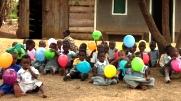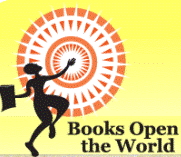Kibale Libraries
Project location: Uganda, Kibale
Project start date: February 2009 -
Project end date: December 2011
Project number: 2008-37
Beneficiary: Books Open The World in Uganda
The economic and human development impacts of libraries have been well-established. Libraries have the capacity to transform individuals and communities by promoting literacy, centralizing crucial community and health information. Despite this well-documented relationship, community libraries continue to be under-supported in Africa. Reading is the essential skill for any further learning and may stimulate independent thought. Therefore, contact with books is important to any education program. Most people in Uganda do not have books home, and children books are even rarer. Schools have few story books, most in English. However, command of English is often insufficient to enjoy reading in it.
Our goal of ‘Kibale Libraries Project' is to establish more reading centers - community libraries in other villages, where people will have access to books in their own language, of Ugandan writers, children, youth and adult literature and non-fiction including curriculum school books.
After operating for more than 2 years, around fifteen people borrow books daily from each of five community libraries. Return rates not only for patrons but also for books have been extremely high. Nearly all loaned books have been returned to the library. Each library also maintains a register for visitors, where people can write comments about the library, services, or they can make suggestions. Two donated lap-top computers are used by the librarians in the two places that have electricity to record data on book lending patterns and comments from readers. For book reading events in libraries, every Saturday, around 20 children (in one place even more than 40) come to listen stories and draw.
The grant will help to open two community libraries and to keep these reading places running for 2 years. Each library will have 20 boxes of selected books from book-drives in the US. These books are already in Uganda. Books by Ugandan authors, curriculum school books, and books in the two local languages will be purchased from Fountain publishers and femrite. A woman will be selected from each community to run the libraries 3-7 pm Monday-Saturday. Librarians will be trained during a 3-hour workshop and the district librarian, and will subsequently meet with other librarians quarterly. Select librarian: female, literate, prefer teaching background, reliable.
Buy furniture: shelving 2 benches 2 tables 1 chair
Sort and transport books: create mix for all ages and interests and avoid doubles. Presently, we have a surplus of 63 boxes of books (story books for children, dictionaries, encyclopedias, atlases etc.) stored in one rented room in Kanyawara village.
Buy Ugandan Books: A set for each library with 3 copies of all books in the language.
For the requested money, we will pay 2 year rent for library rooms and salaries for librarians. The new reading centers will operate for 6 days a week and will be available for all members of the community.
Although Ugandan literature is rich and Ugandan writers publish and get international awards, there are a few books printed in local languages. English is a official language, but many people do not speak or read in English, especially in the rural places where quality of education is lower and often parents do not speak good English or not at all. On the adult literacy classes organized by BOTW in four villages with the grant from the Nando Peretti Foundation, 91% of students are female. In addition, records from our libraries show that women borrowed mainly books in the local language while men also read in English. One of our board members (FM) wrote a picture guide to Ugandan butterflies that will be published by Fountain Publishers, and had it translated into Rutooro. This will be the first picture book in the local language, which is expected to generate some interest and pride in their natural heritage.
Books open the World will organize a story writing competition for community members living around Kibale National Park. A special committee will choose the best stories in Rutooro and they will put together a ‘Stories from Kibale' book created by the people from that area. We will strive to get it published by for example Fountain Publisher in Kampala and will have it distributed among all reading centers in the area.
Funds from the Nando Peretti Foundation will be used to create opportunities for non-formal education for children and adults, by establishing and maintaining places that cultivate interest in reading and learning. Few informational and educational resources are provided outside of school in Uganda. Libraries have been used around the world not only as a hub of information, but also to supplement educational needs.
We believe that bringing books, especially in local languages, to rural communities is a powerful tool to improve literacy, assist in learning for students facing overcrowded class-rooms, and may help to develop curiosity, imagination, and understanding and tolerance of other cultures. Through the community libraries and other BOTW activities we will bring education and opportunity that is often overlooked in rural communities. Moreover, since there is more and more pressure on land around National Parks, giving people around Kibale an opportunity to study and develop would support conservation efforts in that area.
The results of this project will be measured as 1) the number and composition (age & gender) of library users as recorded in the library books and lap-tops. 2) The number of children participating in Saturday reading and drawing activities. 3) The number of people that come to read or study in the libraries. The project will be called a success when library usage increases over time. Other measures of impacts may be derived from success rate of secondary school students (some of which are supported by
scholarship programs that monitor their performance), and primary school students compared to other areas. We are also in contact with people who studied library science or the impact of libraries on communities, to come to Uganda and work with the libraries.
The other measure is creating local community ownership of the community libraries and their programs. BOTW works closely with local community members and local government officials. We support local ownership of programs and in fact, most of the programs BOTW operate were initiated by local community members. While logistical and financial support is provided from abroad, the local executive board oversees programs and troubleshoots where necessary.
The funds will be collected by organizing different activities in the US and the Netherlands, like talks and co-operation with libraries and primary schools, and tabling at events and markets. The ‘Books Open the World' will also apply for grants to other foundations to extent its scope.






